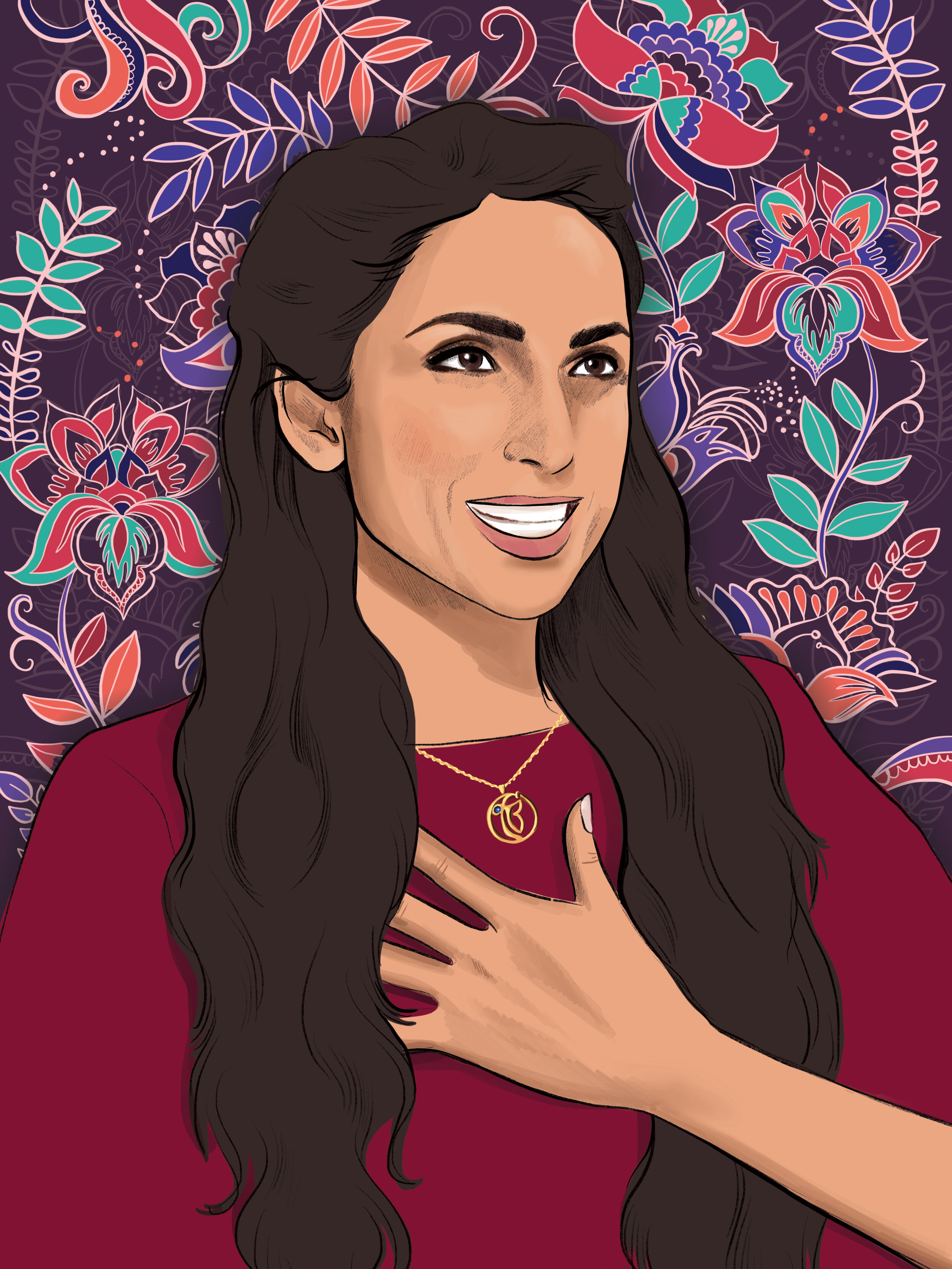The following is a sample profile from the book Holy Troublemakers & Unconventional Saints by Daneen Akers.
Valarie Kaur
It’s recess time, and Valarie Kaur is playing in the schoolyard. She is pretending to be a baby, walking on her knees in the grass with her best friend, laughing. Suddenly a boy appears.
“Get up, you black dog!” he says.
Valarie’s eyes well up with tears. Her family has lived in the Central Valley in California for a century, farming the land. She always felt like she belonged. Now she was encountering hate for the first time.
After school, Valarie jumps into her grandfather’s arms and cries. Her grandfather, whom she calls “Papa Ji,” hugs her and tells her a story. Five hundred years ago, he says, a man named Nanak was saddened by the hate and violence he saw around him. Nanak lived in Punjab, what is now India and Pakistan. He disappeared by a river and meditated for three days and was struck with a vision of a symbol which is now known as Ik Onkar, meaning, “We Are One.”
Illustration by Justine Lecouffe
“I see no stranger,” said Nanak. “I see no enemy.”
Guru Nanak’s followers were called “Sikhs,” students of truth. The Sikh faith is now the fifth-largest organized religion in the world. Sikhs keep their hair long— many wrap their long hair in turbans—to show their commitment to love and justice. Their long hair and turbans are meant to stand out in a crowd, so that you can come to them for help. Valarie’s family is Sikh, but her classmates did not know anything about her faith.
“You must wonder about others, even when they refuse to wonder about you,” says Papa Ji. “You must choose to love them anyway, and fight for them when they are in harm’s way. That’s what it means to be a warrior.”
“But how?” Valarie asks. She is just a little girl with two long braids.
Papa Ji tells her the story of Mai Bhago, the first Sikh woman warrior. In 1705, the story goes, forty soldiers ran away from the battlefield where they were supposed to fight to defend people from an invading army. A young woman named Mai Bhago told them not to be afraid. She put on a turban, mounted a horse, and led the men back into battle. She became the one she was waiting for.
“Do not abandon your post,” Papa Ji says. Valarie looks up at her grandfather and his tall turban. She decides she will work hard to be a warrior one day too. She returns to school and tries to see her classmates who had been cruel to her with eyes of wonder. She starts to practice love in the face of hate.
Valarie’s greatest test came when she was twenty years old. Her Sikh uncle was murdered in a hate crime on September 15, 2001. Balbir Singh Sodhi was killed by a man who saw him as a terrorist and someone who did not belong in the U.S. Valarie ran to her bedroom and cried. She was afraid. Balbir Uncle wore a turban just like her grandfather. She remembered her grandfather’s instruction: “Do not abandon your post.” What did it mean to be a warrior now?
Valarie grabbed her camera and began to drive across America and tell people’s stories in order to fight hate and call for love.
Today Valarie is an American civil rights activist—a lawyer, filmmaker, author, and organizer. She calls people to love each other and themselves through what she calls “Revolutionary Love.” It’s love that stands up to protect everyone, especially those who are most at risk.
“Love calls us to stand up and protect anyone who is in harm’s way—Black people, brown people, Indigenous people, LGBTQ people, disabled people, women and girls, poor people, immigrants, and refugees,” says Valarie. “We are called to see one another as brothers and sisters and siblings—even those who hurt us.”
Starting with that little boy in her schoolyard, Valarie has learned that there is no such thing as monsters in this world, only human beings who are wounded—people who hurt us out of their insecurity or blindness or greed or suffering. So, Valarie and the Sodhi family reached out to her uncle’s killer in prison, and they forgave him.
“Forgiveness is not forgetting,” Valarie says. “Forgiveness is freedom from hate.” Once we are free from hate, we can work together to change the policies and cultures that drive our opponents to hurt us. “The way we make change is just as important as the change we make,” she says.
Valarie’s commitment to Revolutionary Love is inspired by her Sikh faith. Sikhs believe that all people are equal. The Holy Scriptures of the Sikh faith, the Guru Granth Sahib, teach that the Divine resides in every person. “Just as fragrance is in the flower, and reflection is in the mirror,in just the same way, the Divine is in you.”
If you want to hear the Sikh call to love come to life in music and song, attend a Sikh gurdwara, or house of worship, near you on a Sunday morning. Listen to the music, then join the community in a free meal that’s provided after every service.
Today Valarie lives in California with her partner Sharat and their two children, Kavi and Ananda. She knows that her children might face hate in the schoolyard just like she did. She tells them the stories of their ancestors and teaches them they are warriors, just like her grandfather taught her.
On days when the hate and violence in the world is overwhelming, her son Kavi likes to ask her, “Dance Time, Mommy?” And they dance! Their family becomes a pocket of Revolutionary Love. Revolutionary Love is the practice of loving others, our opponents and ourselves. That means letting in joy each day.
“Joy returns us to everything that is good and beautiful and worth fighting for,” Valarie says. “Joy gives us energy for the labor for justice. Let joy be your lifeblood.”
How can you practice Revolutionary Love?
Glossary Terms
Called
The sense that God, or a messenger of God, has specifically assigned a person a certain job; often applied in religious job settings, such as, “I was called to become a minister.”
Civil Rights
The basic rights that every citizen has under the laws of the government.
Culture
The customary beliefs, traditions, art, food, dress, and ideas of a particular people and place.
Gurdwara
A place of worship for Sikhs.
Hate Crime
A crime committed because the criminal doesn’t like something about who the victim is such as their race, religion, sexual orientation, or gender identity.
Indigenous
The original or Native people in a region or country. Indigenous people are descended from the original inhabitants of the land they live on. In the U.S., Indigenous people are usually called “Native Americans.” In Canada, they are called “First Nations” people. Today there are an estimated 370 million Indigenous people in 90 countries who speak 7,000 languages.
Meditation/Meditate
Thinking deeply or quietly focusing one’s mind for a period of time for religious or spiritual purposes or to relax.
Revolutionary Love
An idea about love in action from modern-day holy troublemaker and civil rights lawyer Valarie Kaur; a love that stands up to protect everyone, especially those who are most at risk.
Sikh/Sikhism
A follower of Sikhism, a religion founded in what is now Eastern Pakistan and Northern India in the 15th century; Sikhs value equality and service to those in need, believe in one God, and seek to recognize the Divine within all people and creation.
Turban
A headdress made of cloth; usually worn by men, especially worn by Sikhs and some Muslims.
Read another sample chapter from the Holy Troublemakers & Unconventional Saints book by Daneen Akers.



